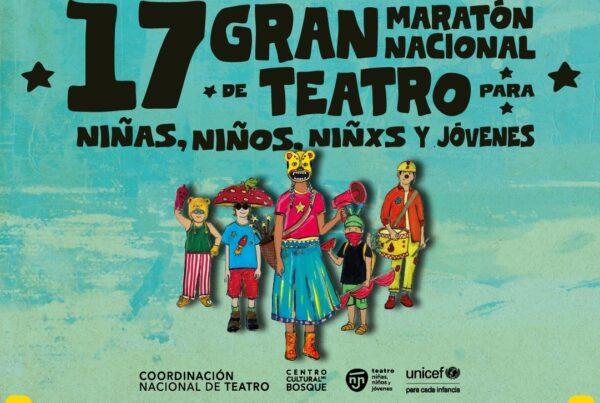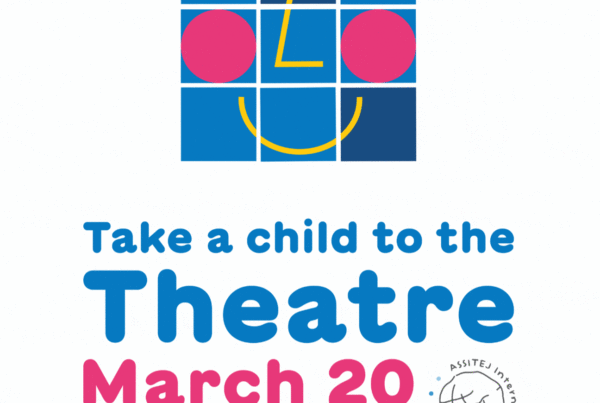ヨシ笈田氏からのメッセージ 〜国際児童青少年演劇デー2020〜
“Since I was born, I grew up mimicking my parents all the time. How to walk, how to eat, and how to talk; I learned all of these from mimicking my parents. Then from when I became old enough to understand things, taken by parents, I learned to go to the theatre. Theatre was for me, the magic country. The first thing you saw when you entered the theatre was a dropped curtain. I remember that I waited for the curtain to rise with a huge expectation wondering what was behind that dropped curtain. When the curtain finally opened, there was a dream world created by a stage set, lighting, and costumes. Sometimes, it was something created just like in the real world, and at other times, it was a landscape impossible in the real world. There were performers in various disguises crying, laughing, singing, and dancing. And during the interval, we were able to hear sounds of banging and clattering. If it was a small theatre, and I was sitting in the front row, I was able to pull up the curtain to peek inside. Surprisingly enough, a scene was being changed in an instant by a big stage set which was turned around and pulled backwards. Then, afterwards at home, I would mimic the actor. My favorite was a samurai role. I drew on manly eyebrows, made a wig, and played swordfights with my friends using bamboo swords. By the time I was a 7th grader, I started making scale models of a stage set; a revolving stage, a stage set with lights made of miniature light bulbs…. And of course, I attempted scene changes with it.
Having escalated from these experiences, eventually I entered a professional theatre company. But at that time, there was no school for contemporary theatre. I went to a master of conventional theatre and learned theatre techniques conventionally handed down. To learn the conventional theatre means to mimic everything that the master does and to make an effort to be exactly like the master. Then one day, I unexpectedly earned a chance to do a work under Peter Brook. The first lesson I had with him was in improvisation, which I had never experienced. Even though I was told to do improvisation, I had no idea what to do, so I started making movements combining all the conventional ones that I had learned in Japan. But one day, Brook gave me a note saying, “Don’t mimic the Japanese conventional theatre”. Struck by his note, I felt as if I had been thrown alone into the great ocean. I had nothing to depend on and was like a wrecked ship simply drifting here and there. But this was the moment when I started to think about creating for the first time. I realised that my work was not simply to reproduce what existed in the past in the way the conventional theatre does, but to create my own expressions. And to create is not to create something from nothing as God does, but to mimic what has previously existed and go beyond it. Van Gogh was influenced by Ukiyoe, Picasso created his own paintings inspired by African arts, and Miro got suggestions from the Chinese characters; all has been developed from what has already existed.
The path I have taken is probably the same. My life was to mimic whatever I saw and heard in theatre and then to make efforts to go beyond that. And this experience has led me to find a way of living, passing through and beyond theatre.”
Yoshi Oida
Actor, Director, and Writer. Born in Hyogo Prefecture in 1933. He currently resides in Paris, France. He started his career as an actor at Bungakuza and at Shiki Theatre Company. Since 1970 he worked with Peter Brook at CIRT (International Centre for Theatre Research). He has acted in Mahabarhata, Tempest, and The Man Who, directed by Peter Brook, Shunkin, directed by Simon McBurney and many more. He has also directed a number of plays and operas. The book “An Actor Adrift” which he wrote published in 1989 has been translated into 17 languages and treated as “actor’s bible” in all over the world. He has received the following honors from the French Government; Chevalier de l’Ordre des Arts et des Lettres, France (1992), Officier de l’Ordre des Arts et des Lettres, France (2007), and Commandeur de l’Ordre des Arts et Lettres, France (2013).
ヨシ笈田 国際児童青少年演劇デー メッセージ
僕は生まれてからずっと両親の真似をして大きくなりました。歩くこと、食べること、喋ること、すべて両親の真似をして覚えたのです。そして物心がついてからは両親に連れられて劇場に行く事を覚えました。劇場は僕にとっては魔法の国でした。劇場に入ってまず最初に目につくのが緞帳です。緞帳の後ろには何があるのかしらと大きな期待を持って開演を待ちました。遂にその幕が上がると、その後ろには装置と照明と衣装で作り上げられた夢の世界がありました。それは現実そっくりに作り上げられたものであったり、現実ではありえないような風景が現れて来るのです。そこでは様々な姿をしたパホーマーが 泣いたり笑ったり、歌ったり踊ったり。そして幕間になると幕の向こう側でドンドン、ガタガタという音が聞こえて来ます。小さな劇場ですと客席の一番前の席からそっと幕をめくって中を覗くことが出来ました。驚いた事に幕の向こう側で大きな舞台装置が回ったり引っ込んだりして瞬く間に情景が変わって行くのです。あとは家に帰って役者の真似をする事です。侍の役が一番好きでした。眉を凛々しく描いて紙で作り、竹光の刀で友達と斬り合いをするのです。中学一年ぐらいには舞台の模型まで作り始めました。回り舞台を作り装置を作 って豆電球で照明を作り、そうして勿論舞台転換も、、、
それがエスカレートして遂にはプロフェッショナルの劇団に入りました。しかし日本では当時まだ、現代劇の演劇学校がなかったので仕方なく古典劇の師匠の所に行って、昔から伝わる演劇のテクニックを学びました。古典劇を学ぶと言う事は全て師匠のモノマネをして師匠そっくりになる様に努力する事です。それでも現代劇を続けているうちにある日、思いもよらず brook のもとで仕事をするチャンスを得ました。最初のレッスンは今までに経験した事のない即興劇でした。即興劇をやれと言われても何をやっていいかわからなかったので日本で習った古典の動きを組み合わせて動き始めました。しかしある日、 Brook から「もう日本の古典演劇の真似をするな」とダメが出ました。そう言われて僕はまるで大海に一人放り出された様な気持ちになりました。頼るものが何もなく、ただあちこちを漂う難破船のようでした。しかしその時、初めて創ると言うことを考え始めたのです。自分の仕事は単に古典演劇の様に過去にあったものを再現するのではなく、自分独自の表現を創り出す事だと気ずきました。そして創るという事は神様の様に無から有を生じる事ではなく以前にあ ったものを模倣しそれを乗り越える事なのです。浮世絵に影響されたゴッホ、アフリカ芸術から自分独特の絵を創り出したピカソ、漢字からヒントを得たミロ。すべて既に存在したものからデヴェロップされたものです。
僕のたどった道のりも多分同じだったと思います。観たり聴いたりした演劇の
真似をして、それから抜け出そうと努力した人生でした。そしてそれが演劇を通り越して、いかに生きるかという事に繋がって行ったのです。





